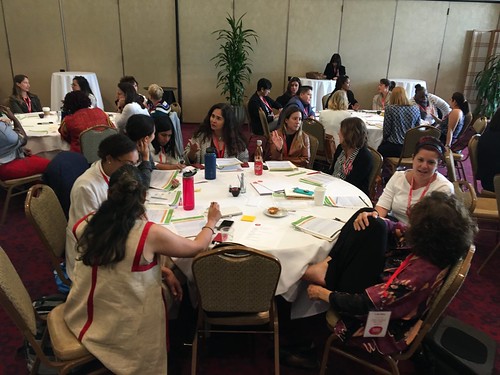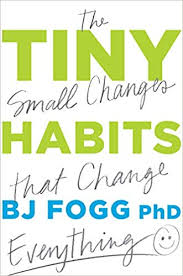
This week I was honored to facilitate a mini-workshop, “The Happy Healthy Woman Leader, at the Women Funded 2019 conference in San Francisco. The session was based on my book, The Happy Healthy Nonprofit and covered the topics of recognizing burnout and stress, creating a self-care plan, and implementing new personal resilience habits. The participants represented a wide range including activists, funders, and nonprofits.
As a trainer, I know the importance of ensuring that people take concrete ideas to put it into action after the training. And, in the course of writing my book, I also know that making personal resilience or self-care into action requires habit change.

There is not better expert on habit change that BJ Fogg whose Tiny Habit framework I’ve been using for over five years in all my trainings. (His new book, Tiny Habits That Change Everything, will be published at the end of this year.)
Tiny Habits—created by Dr. BJ Fogg, a world-renowned Behavior Scientist at Stanford University—is based on 20 years of research and Dr. Fogg’s experience personally coaching over 40,000 people. What Dr. Fogg has coined “Behavior Design”—cracks the code of creating new habits.
In a nutshell, Tiny Habits Framework 1) identify a new habit; 2) make it tiny; 3)find a trigger in your routine that will prompt you to do the habit.
As he explains in this NPR interview you should focus on building the habit itself, rather than worrying about how big the impact is. One example he offers is this: You want to begin a habit of flossing your teeth every night after your brush your teeth. To build a successful habit, start with something tiny: flossing just one tooth. While it might sound silly, but it works. If you’re building the habit of flossing just a single tooth each night, Fogg three things will happen:
1) You’ll feel silly about not doing it. Flossing a single tooth is so easy, it’s hard to feel okay about skipping it.
2) You’ll probably floss more than one tooth. Getting started on anything is the biggest hurdle. Once we’ve started, it’s easy to just keep going.
3) You’ll build the habit. Although flossing just one tooth each night probably won’t make your dentist too happy, after a few weeks have passed, the action will start to become a habit, i.e. something you do automatically, without thinking about it.
Once you’ve built up the habit, then you can add to it incrementally.
As part of the workshop, participants shared what their new personal resilience would be, how they would make it tiny and the trigger for doing it. Here’s a few examples:
- Take 10 minute walk everyday at lunch
- Set aside 10 minutes when I first arrive in the morning to organize my day vs jumping in answering emails
- Dance for 10 minutes every morning every day after I have a cup of coffee
- Don’t listen to political podcasts walking to the bus stop everyday for work and just enjoy the walk.
- On the bus from work to home, call my mom and ask her how her day was.
- Do a 3 minute headspace mediation first thing when I arrive at my desk before starting my email.
- Take a ten minute break from my desk at 11:00 am every morning and will add to my google calendar
What personal resilience or self-care habits have you put into place? How did you successfully create the new behavior?

Leave a Reply